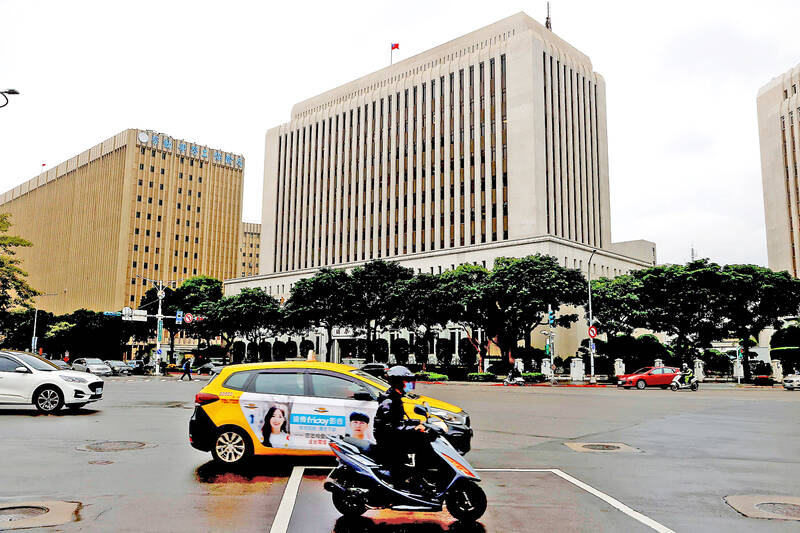Taiwan’s accounts last quarter registered a US$29.11 billion surplus on the back of improving exports, but capital outflows grew by US$29.19 billion, leaving the balance of payments (BOP) at a deficit of US$330 million, the central bank said yesterday.
It is the first BOP deficit since the third quarter of 2022, the central bank said, adding that its effort to slow the local currency’s depreciation against the US dollar contributed to the deficit.
The central bank said there is no need to worry about the difference between the capital outflows and current account surplus because it is quite small.

Photo: Ann Wang, Reuters
The rapid capital outflows also had to do with active purchases of US government and corporate bonds by local banks, life insurers and individuals on expectation that the US Federal Reserve (Fed) would cut interest rates later this year.
Interest rate cuts would boost bond prices.
The Fed has said it would cut rates when it is confident enough that inflation is headed toward its 2 percent target.
The US consumer price index last month grew 3.4 percent from a year earlier, but the Fed said it would not be considering interest rate hikes.
It is common for countries with current account surpluses to see capital outflows, because financial institutions need to digest idle funds and pursue returns, the central bank said.
Capital outflows also happen in Japan, Germany, Singapore and South Korea, the central bank added.
The high interest rates in the US make its government and corporate bonds safe and attractive investment targets, and the US dollar has benefited from global fund deployment, the central bank said.
At the same time, the deficit in the services account widened from US$2.17 billion to US$2.54 billion, as outbound travel increased and inbound tourist arrivals continued to leave much to be desired, the central bank added.
The number of Japanese tourists, for instance, have not returned to pre-COVID-19 pandemic levels, given the weakening of the yen, which makes overseas travel expensive for the Japanese, local hotels have said.

Merida Industry Co (美利達) has seen signs of recovery in the US and European markets this year, as customers are gradually depleting their inventories, the bicycle maker told shareholders yesterday. Given robust growth in new orders at its Taiwanese factory, coupled with its subsidiaries’ improving performance, Merida said it remains confident about the bicycle market’s prospects and expects steady growth in its core business this year. CAUTION ON CHINA However, the company must handle the Chinese market with great caution, as sales of road bikes there have declined significantly, affecting its revenue and profitability, Merida said in a statement, adding that it would

Greek tourism student Katerina quit within a month of starting work at a five-star hotel in Halkidiki, one of the country’s top destinations, because she said conditions were so dire. Beyond the bad pay, the 22-year-old said that her working and living conditions were “miserable and unacceptable.” Millions holiday in Greece every year, but its vital tourism industry is finding it harder and harder to recruit Greeks to look after them. “I was asked to work in any department of the hotel where there was a need, from service to cleaning,” said Katerina, a tourism and marketing student, who would

i Gasoline and diesel prices at fuel stations are this week to rise NT$0.1 per liter, as tensions in the Middle East pushed crude oil prices higher last week, CPC Corp, Taiwan (台灣中油) and Formosa Petrochemical Corp (台塑石化) said yesterday. International crude oil prices last week rose for the third consecutive week due to an escalating conflict between Israel and Iran, as the market is concerned that the situation in the Middle East might affect crude oil supply, CPC and Formosa said in separate statements. Front-month Brent crude oil futures — the international oil benchmark — rose 3.75 percent to settle at US$77.01

RISING: Strong exports, and life insurance companies’ efforts to manage currency risks indicates the NT dollar would eventually pass the 29 level, an expert said The New Taiwan dollar yesterday rallied to its strongest in three years amid inflows to the nation’s stock market and broad-based weakness in the US dollar. Exporter sales of the US currency and a repatriation of funds from local asset managers also played a role, said two traders, who asked not to be identified as they were not authorized to speak publicly. State-owned banks were seen buying the greenback yesterday, but only at a moderate scale, the traders said. The local currency gained 0.77 percent, outperforming almost all of its Asian peers, to close at NT$29.165 per US dollar in Taipei trading yesterday. The